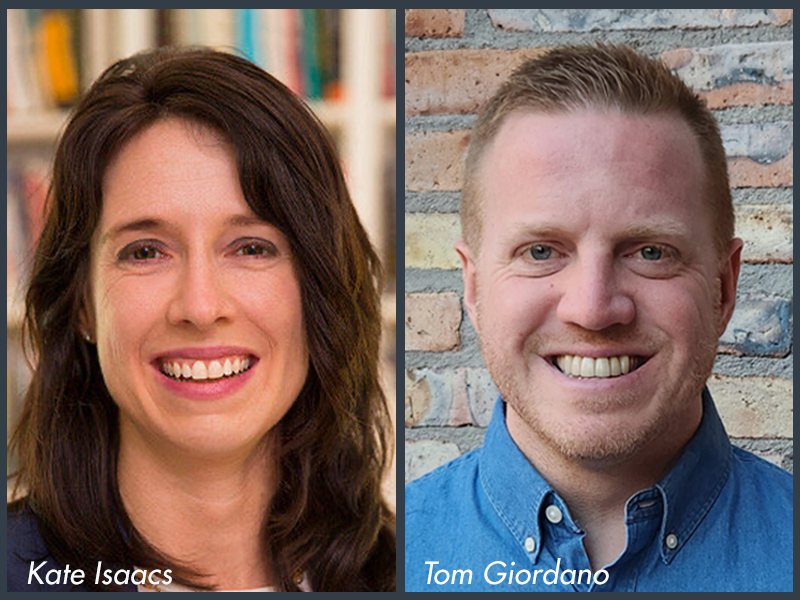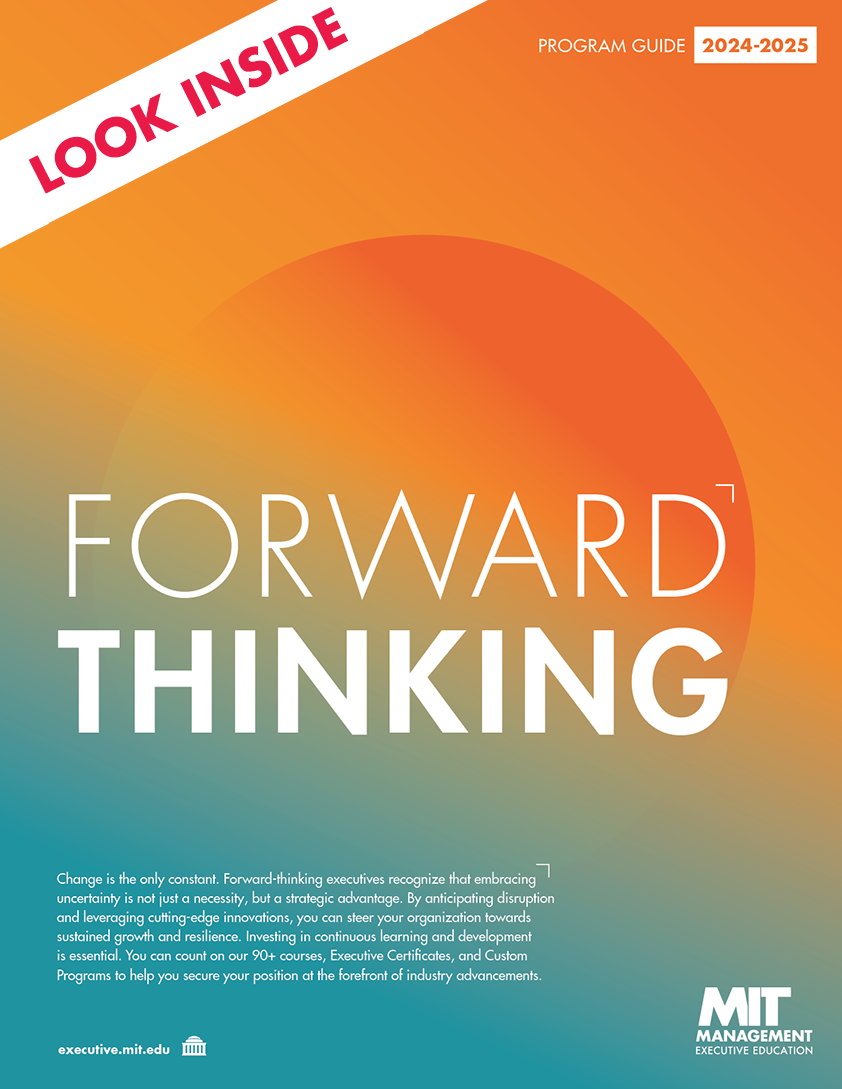MIT Sloan Executive Education and the Partnership for Rhode Island are collaborating to launch a first-of-its kind program, the BILT-Lab (Businesses for Inclusive Local Thriving), for company leaders who want to tackle their own talent needs and advance their region’s competitive future-forward innovation strategy by training a workforce of the future.
Tom Giordano, Executive Director of the Partnership for Rhode Island and BILT-Lab Cofounder, illustrates the power and potential of the training that BILT-Lab can offer companies and regional economies. Rhode Island’s innovative economic development strategy, Grow Blue, is designed to advance the state’s unique economic assets and strengths through ocean robotics, defense, ocean sciences, and marine tourism. Developed by a multi-stakeholder coalition of groups in the state, and supported by the Partnership for Rhode Island, the strategy had widespread backing from Rhode Island’s business, government, and educational leaders.
But as Rhode Island’s leaders rolled the strategy out, they were continually asked the question: “How will the Blue Economy lead to jobs and investment?" The Partnership responded by strengthening the connections between the Grow Blue strategy and the state’s talent development pipelines. The playbook existed in the Westerly Education Center, which brings together higher education institutions, businesses, industry, and community partners to train people to meet projected workforce growth in the region. In one program, Westerly teaches thousands of welders, often with very little prior training, for hire by General Dynamics Electric Boat, which builds submarines for the US Navy. The result: a triple win for people, whose careers and their lives enter into a new trajectory to prosperity, employers, who get the talent they need, and the region as a whole to advance its economic strategy. Now the Partnership is building on this success to convene organizations across the state to build efficient and effective workforce pipelines to drive the state’s entire blue economy strategy.
Finding and keeping talent is a big pain point for companies today. But as Rhode Island has discovered, the problem can’t be solved by individual companies along. Instead, it takes a system. Giordano and Isaacs are now partnering to bring MIT’s research and teaching capabilities and PRI’s economic and convening power together to help more companies learn to do systems change that drives regional economic innovation, creates inclusive prosperity, and healthy, safe, resilient communities.
In this 13-week program, participants will diagnose and take action on their company’s and their larger region’s strategy to train, hire, and retain a diverse, future-ready workforce with advanced relational and technical skills. As part of the program, participants will design and take early action on one “inside the walls” company-level improvement strategy and one “outside the walls” collective systems change strategy to develop a diverse, future-ready workforce.
Participating companies should represent a major strategic pillar of their region’s economic development strategy, and BILT-Lab participants should hold significant budgetary and decision-making responsibility for their company’s inclusive future-ready workforce development strategy. Joint sponsorship from the CEO and head of Talent/HR/People is required, and participants are highly encouraged to sponsor local workforce development partners to attend BILT-Lab, including leaders from: local business coalitions and Chambers of Commerce, and local nonprofits, educational institutions, government, and foundations.
A powerful partnership
The impetus for BILT-Lab grew over the last two years as Kate Isaacs (Senior Lecturer, MIT Sloan) and Tom Giordano partnered to think about how to equip more business leaders with the right mindset and skills to engage in place-based work. Combining their thought leadership and practical experience in areas of corporate social responsibility, community engagement, public-private partnerships, government infrastructure, and local business coalitions, BILT-Lab was born.
Isaac’s research for the past twenty years has focused on the connection between business leadership for economic, environmental, and social thriving, which requires multi-stakeholder partnerships. Within the last five years, her thought leadership has expanded to include ways companies may be able to contribute to the talent crisis in the country. “It’s imperative we focus on reskilling people for the future,” Isaacs states. “I find that a lot of business leaders resonate with the idea of getting more local with their talent development and retention strategies. Talent is a national priority but regional needs are unique and the solutions are hyperlocal—requiring intimate knowledge of the local stakeholder ecosystem.”
As an experienced advisor and executive for over a decade, Giordano brings the valuable perspective of business leaders, non-profit organizations, and government agencies. (He works closely with the Governor’s office in Rhode Island to find ways to solve the systemic issues related to workforce, education, and infrastructure). As someone with boots on the ground, Giordano reveals, “What we’re seeing with CEOs is that there’s an enormous desire and continued priority to invest in an inclusive workforce development pipeline but there’s very little common experience or knowledge sharing across regions, companies, cities, and towns. What works in one state is kept siloed and not often shared to benefit others.”

With BILT-Lab, Isaacs and Giordano intend to break down those silos and create a shared language and best practices – regardless of industry. “By building something at MIT Sloan we can use the academic firepower housed here, but also align those who are doing it on a day-to-day basis,” Giordano states. “We’re better preparing our companies to lead and doing so by including community and government leaders in that conversation. That’s the only way it’s going to work and be sustainable.”
Building a better pipeline
The competition for talent – while facilitating inclusion and dignity in the workplace – has been a growing focus and priority among businesses in recent years. Successful business leaders have turned their attention to growing and developing talent from regional and local sources, while helping to solve larger systemic issues in the process. (The talent problem and issues related to infrastructure, childcare, affordable housing is often intertwined). “We see more business leaders wanting to provide leadership on those systemic issues, but they can’t do it alone,” Isaacs states. “They need to partner.”
Isaacs shares a case study involving American Electric Power’s (AEP) initiative to upskill coal workers in the midst of shuttering their coal plants in Appalachia. Instead of leaving the community high and dry, they evaluated the transferable skillset the current workforce possessed. Upon discovering a concentration of highly skilled metalworkers, AEP led systemic efforts to certify the region as “AEROready ” in order to attract aerospace and aviation companies. While AEP was withdrawing its regional footprint in one way, it was elevating the community economy and workforce in other ways. This was not implemented purely out of altruism, there was a business benefit too. The stronger the regional economy, the more business that AEP could do in the region. The business ROI matters when making the case for community investment.
The business case for inclusive prosperity
Above all else, BILT-Lab is outcome-focused and results driven. Isaacs and Giordano are aware a moralistic argument alone for implementing systemic change isn’t enough, especially in an increasingly polarized world.
“It’s about making practical arguments. The issues business leaders work on have to be tied to ROI and a successful strategy,” Isaacs explains. As demonstrated in the AEP case study, you can’t have good workforce participation if you’re going to leave behind a significant part of the population. Yes, we need to do inclusivity and diversity because it’s the right thing to do. However, the argument for change should also focus on what makes good business sense – in this case ensuring as much valuable talent as possible is being trained with the right skills and removing obstacles that hinder that flow of upskilling and reskilling. “Talent is evenly distributed in the population but opportunity is not. We simply cannot exclude large portions of the population if we’re going to hope to be competitive on the global stage.”
“Talent is evenly distributed in the population but opportunity is not. We simply cannot exclude large portions of the population if we’re going to hope to be competitive on the global stage.”
Giordano agrees that focusing on corporate social responsibility, DEI, and ESG are more digestible when one can demonstrate there’s value not just for the community, but the company bottom line. “If a large investment house is no longer talking about ESG, for example, it doesn’t mean they’re pulling back from the community,” Giordano states. “It just means they need to better understand where to place those funds, time, resources, and volunteer hours. They need to know the investment is being impactful, and place-based is the way to do it.” BILT-Lab will help participants develop a playbook about how to engage with local thriving that provides a strategic and practical business case.
Reducing risk, accelerating learning
“CEOs, community-based organization, governors, mayors – it doesn’t matter what side of the political aisle they’re on, they’re all prioritizing a workforce development pipeline,” Giordano reveals. However, while everyone is trying to implement these initiatives, there’s a lack of communication and shared experiences that hinder the outcome or waste effort by reinventing solutions that are already out there but are hidden away in a regional pocket of innovation.
Giordano continued, “BILT-Lab will be impactful in limiting the amount of waste and error. By sharing best practices, learning from one another, building the common language, and understanding what the landscape looks like, participants will emerge with a strategic plan that is not only primed to succeed, but fundable. By attending they’re not only going to save time and money on their efforts, but they’re also going to save on failure.”
Isaacs further expands that while many business leaders want to drive systemic change, they can’t make meaningful impact alone. BILT-Lab will provide the opportunity for participants to explore new ways of leadership that don’t rely on formal positional authority. The traditional command and control framework isn’t effective when convening multiple outside stakeholders. (Isaacs’ research on distributed leadership reflects this.) “Participants will explore how to lead responsibly in these situations. How do they use the power they do have – convening power, economic power, the power of their reputation in the community – to bring folks together and make things happen?”
In order to build that shared language, participants will review various case studies and best practices. There will also be a module focused on defining personal leadership styles so participants can bring their authentic selves to the table and build trust with various stakeholders. “It’s a safe space for them to reflect on these big questions around power, equity, and authenticity. People will be contributing to each other’s learning as much as they’ll be learning themselves.”
Other tangible takeaways
BILT-Lab participants should bring a strategic priority they’re ready to workshop and accomplish as part of their current role. In addition, each participant/team will be assigned a coach they’ll meet with through the duration of the program to provide valuable advice regarding their implementation strategy and ensure they stay on track.
“First, participants of BILT-Lab will leave with a shared mindset,” Giordano states. “Second, they’ll leave with a strategic plan or ‘playbook’ that will allow them to execute in the world what they designed in the classroom. And lastly, we’ll focus on funding. I think it’s important that future participants know they’re leaving with something they can hold in their hand, as well as newly refined relational and team skills.”
Isaacs expands further on the classroom experience. Participants will have access to various MIT faculty from across the Institute (not just Sloan) who are thought leaders on systemic change. There will also be a variety of guest speakers who are experts on the place-based dimension of corporate social responsibility and sustainability across a variety of industries and sectors. Lastly, they’ll learn a lot from their fellow participants. They’ll leave having built a valuable ecosystem they can continuously rely on. “BILT-Lab will seed the beginning of a best-practice clearing house that defines how you do this work well and develop that shared knowledge base.”
Who should attend?
Ideal program participants are “Company leaders from regions that are looking to compete,” Giordano states succinctly.
Isaacs adds that participants should hold a senior position within their organization and be sponsored by the CEO to ensure accountability between the project they are advancing in the BILT-Lab and the top-level strategic priorities of their company. “We’ll be inviting the sponsors to the closing session to hear what participants have done in the program and highlight the value they’ve created.”
They also encourage participants to attend alongside local business peers who share their commitment and are willing to collaborate in building and scaling an inclusive workforce development pipeline. In addition, companies are encouraged to bring two or more local non-business partners who will be important contributors to the project they have in mind. “For example,” Isaacs offers “if it’s a project to upskill workers, is there an educational institution and a non-profit partner in the community that would be important stakeholders? Think of it as an opportunity to align and build trust in a core leadership team across sectors.”
Hinting at who else will already be in the room, Giordano reveals participants include a community foundation from Texas, a state university, and members from other business-led coalitions across the country. “The common thread is they feel their regions need some professional leadership development or skill building in order to compete.”
Learn more about BILT-Lab and apply for the 2024 session here.








